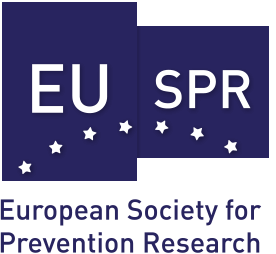
- Poster PresentationsPoster competition winning posters from the 2012 EUSPR 1st Place Dr Daniel Hale – A Systematic Review Of Effective Interventions For Multiple Risk Behaviour General and Adolescent Paediatrics, Institute of Child Health, University College London, UK Contributing authors: Hale D, Fitzgerald-Yau N, Viner R 2nd Place P K Budzyna-Dawidowsk – Terms of Engagement: increasing efficacy of preventative interventions …
- Plenary Speaker Presentations2012 EUSPR Conference Plenary Speaker Presentations Prof Marc A. Zimmerman, School of Public Health, University of Michigan (USA) – Adolescent Resiliency: Applications of Theory and Research Prof Judith Prochaska, Stanford University (USA) – Methods of quantifying change in multiple risk factor interventions Dr Patricia Conrod, Université de Montréal (CA) – Individual- and population-level benefits of …
- Poster CompetitionBack to main 2012 conference page We held a special guided poster session as part of Day 1. There were prizes for the best poster including one year’s free Society membership and free conference fees for next year’s conference. Awarded presenters were invited to present and discuss their work to all conference delegates in …
- ProgrammeBack to main 2012 conference page Day 1 – 6th December 8.30 – 9.30 Registration 9.30 – 9.45 Opening and salutations Prof Harry Sumnall (EUSPR Board President), and Krzysztof Brzozka – the Director of the State Agency for Prevention of Alcohol Related Problems (PARPA) 9.45 – 11.15 Plenary Session 1 Chair: Prof Harry Sumnall …
- EUSPR Conference 2012, 6-7 December 2012, Kraków, PolandThe Third EUSPR conference was held in Kraków, Poland on 6-7 December 2012. The conference theme was Common risk and protective factors, and the prevention of multiple risk behaviours. View full report…
- Third EUSPR Conference and Members’ Meeting, 6-7 December 2012, Kraków, Poland“Common risk and protective factors, and the prevention of multiple risk behaviours” Several health related behaviours share common risk factors and comprehensive programmes could be effective by addressing them together. Health services have tended to overlook the potential for prevention to intervene between the emergence of problems or vulnerabilities early in life and manifestations, for …
